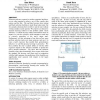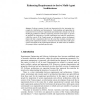1047 search results - page 7 / 210 » Learning the required number of agents for complex tasks |
AAAI
2008
13 years 10 months ago
2008
Particle filtering algorithms can be used for the monitoring of dynamic systems with continuous state variables and without any constraints on the form of the probability distribu...
CIA
2006
Springer
13 years 11 months ago
2006
Springer
Intelligent coordination in complex multi-agent environments requires sophisticated mechanisms for suboptimal task decomposition and efficient resource allocation provided by the t...
IUI
2009
ACM
14 years 4 months ago
2009
ACM
Selection tasks are common in modern computer interfaces: we are often required to select a set of files, emails, data entries, and the like. File and data browsers have sorting a...
WER
2004
Springer
14 years 29 days ago
2004
Springer
Software systems of today are characterized by the increasing size, complexity, distribution and heterogeneity. Understanding and supporting the interaction between software requir...
CSL
1998
Springer
13 years 7 months ago
1998
Springer
This paper presents PARADISE
PARAdigm for DIalogue System Evaluation
, a general framework for evaluating and comparing the performance of spoken dialogue agents. The framework d...


